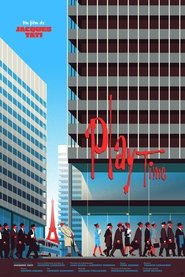Despite it being a 'silent' film, there are some jokes that benefit from a little bit of French. For instance, the final scene with the cars moving around the roundabout like a fairground ride is a pun on the French word for traffic, circulation.
If the perception of most contemporaneous viewers was that he peaked early and went into a steady decline that bottomed out with the bloated and shapeless PlayTime, it now looks to most of us as if PlayTime was the climax of his life’s work, a project to render the gag abstract, and to find a beauty in it so intense that we may be afraid to laugh.[…]
Having created a famous trademark in Hulot’s distinctive costume, Tati in PlayTime turns loose a series of false Hulots to confuse the audience—and his other characters—teasing us with look-alikes and hinting at the universality of his persona. Some inner artistic perversity seemed to compel him to marginalize his most recognizable character, and it has taken most of us decades to admit that he knew exactly what he was doing.
— David Cairns (Criterion)
Each of Tati’s movies […] seems like a quantum leap forward in ambition and accomplishment. Jour de Fête is thoroughly charming, full of local colour and graceful mime. Les Vacances de M. Hulot, imperishable favourite of a generation of film-goers who were young in the Fifties, makes us ache with nostalgia for a kind of seaside holiday we have never experienced, and at the same time shows Tati beginning to acquire a view of the world: curious, beady-eyed, at times politely scathing. In Mon Oncle, he attempts something like satire, and the result is interesting, if somehow stiff and unattractive. […] And then there was Playtime.[…]
Like many great directors’ folies de grandeur it was widely misunderstood on release, by a hostile press made all the more antagonistic by Tati’s standoffish and over-protective attitude during the protracted shoot. The public, too, had been expecting another straightforward Monsieur Hulot vehicle, packed with well-signposted sight gags. What they got instead was an almost abstract exercise, in which the enormous screen was packed with beautifully choreographed action while Tati as Hulot wandered ineffectually at the edges of the frame, his presence rendered all the more vaporous by the inclusion of a number of false Hulots, all sporting the trademark raincoat and pipe, drifting in and out of enveloping crowds. […] You don’t laugh aloud when watching Playtime, or at least not very often: you sit there with an immovable smile on your face, buoyed up by the film’s impossibly sustained ingenuity and high spirits.
[…]
Playtime is that rare phenomenon, a film targeted squarely at a popular audience which was nevertheless made with the loving, manic perfectionism we associate with the greatest works of art. The fact that it missed that audience completely, that its breezy lack of interest in narrative and characterisation (those comfort blankets of the mainstream cinema) propelled it straight out of the movie-houses and into the columns of Cahiers du cinéma, is, frankly, a tragedy of incalculable proportions.
[…]
[David Bellos] writes that ‘Tati was not out to change the world, but to help us look at it with less horror.’ Playtime […] certainly does that; but sadly, for Tati and for us, it does it with a diffidence and patient artistry that makes it wildly out of kilter with today’s cinematic fashions. The thought that a piece of slipshod, invention-free, self-satisfied garbage like Austin Powers: The Spy who Shagged Me can clean up at the box office while Playtime remains unreleased in the US and all but forgotten in Europe ... Well, not even Tati’s work, nor Bellos’s measured and affectionate tribute to it, can reconcile me to the horror of that.
— Jonathan Coe (London Review of Books)
Since the beginning of sound film, only Chaplin has had the same privilege, that sovereignty of being present even when he wasn’t filming and, when he was filming, of being exactly on time, which is to say just a little early. Tati: a witness first and foremost. [And] it’s in Tati that one best perceives, from one film to the next, French cinema’s characteristic oscillation between populism and modern art.[…]
Playtime, a great anticipatory film, builds the La Défense business district before La Défense [business district] exists, but already says that French cinema can no longer deal with the gigantism of French society, that it’s no longer ‘up to it’.
[…]
Watching Playtime, one has a tendency to forget that all the actions one sees undertaken are ultimately relatively successful: Hulot finally meets the man with the Band-Aid on his nose whom he had an appointment with, he fixes the street light, is reconciled with the manufacturer of silent doors, and at the last moment even manages to get an admittedly piddling gift to the young American woman. Similarly, the opening of the royal garden is a success: the vast majority of customers dance, dine, and pay. Nothing really goes wrong in Playtime, though nothing works.
— Serge Daney (New Left Review Sidecar)
Synopsis: Clumsy Monsieur Hulot finds himself perplexed by the intimidating complexity of a gadget-filled Paris. He attempts to meet with a business contact but soon becomes lost. His roundabout journey parallels that of an American tourist, and as they weave through the inventive urban environment, they intermittently meet, developing an interest in one another. They eventually get together at a chaotic restaurant, along with several other quirky characters.

